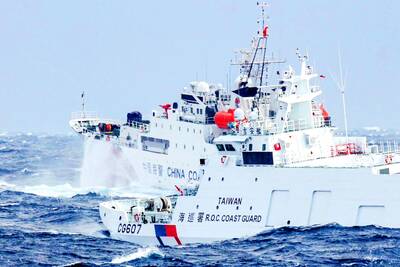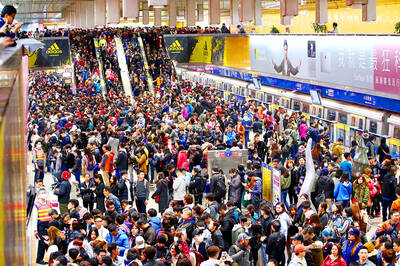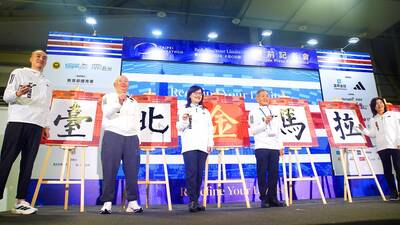Unhappy with President Ma Ying-jeou’s (馬英九) inaction in helping to preserve the Lo Sheng Sanatorium despite earlier promises, preservation activists again staged a demonstration outside Ma’s residence — but they were completely ignored this time.
The activists, including Youth Alliance for Lo Sheng members, Lo Sheng residents and sympathizers arrived in front of Ma’s apartment in Taipei City’s Wenshan District (文山) around 6:30am without prior notice — most media organizations were given the information less than an hour before their action.
“Down with Ma’s bad check!” “Stop lying!” “Save Lo Sheng now!” they shouted as they sat on the sidewalk across the street from the apartment building where Ma lives.
The demonstrators, numbering around 50, were surrounded by dozens of civilian and military police officers, as well as agents from the National Security Bureau.
The sanatorium, located in Sinjhuang City (新莊), Taipei County, was built in 1930 during the Japanese colonial period to isolate patients of Hansen’s Disease — also known as leprosy — as it was believed to be highly contagious at the time.
A decision to demolish buildings of the sanatorium complex to make way for a Mass Rapid Transport (MRT) maintenance depot drew criticism from preservationists who think forced eviction of elderly former patients who have lived on the campus for decades is a violation of human rights, and that the demolition itself is a destruction of buildings with historic value.
After more than three years of struggle, the government made a concession last year and came up with a plan to preserve 40 buildings on the campus. However, the Department of Rapid Transport Systems would only guarantee the safety of 15 buildings during the construction.
Unable to get a positive response from government authorities, the preservationists turned to Ma and staged their first surprise demonstration in June.
At the time, Ma took about two minutes to talk to preservationists, accepted a petition letter and promised to “ask relevant government agencies to take care of it” before jumping into a car to head to work.
In fact, since the sanatorium is situated right on the border between Taipei and Taoyuan counties, Ma suggested during the presidential election that he would help negotiate to have the Sinjhuang MRT line extended to Taoyuan and build the maintenance depot there.
However, this time, when the activists returned to urge Ma to fulfill his promises, Ma chose to ignore them.
As the presidential convoy approached around 7:20am, an unidentified man, seemingly an officer, showed up and told the uniformed police at the scene to issue warnings to demonstrators and order them to leave.
While the man was engaged in a verbal dispute with the demonstrators and when all the attention was centered around the dispute, Ma appeared all of a sudden and quickly got into the car before leaving.
After Ma’s convoy drove away, the man also quickly walked away.
When approached by reporters, he declined to give his name or his occupation.
“We are here trying to ask for help from the president, but it’s disappointing that he didn’t even bother to talk to us,” Tang Ming-hsiang (湯明祥), a Lo Sheng resident, said afterwards.
“Ma said that he considers the protection of human rights an important issue, but what about our rights? One of the residents to be forcibly evicted is over 90 years old and has heart disease!” Lan Tsai-yun (藍彩雲), another resident, said. “I think I voted for the wrong person!”

READY: The CGA said it closely monitored China’s maritime exercise, deployed vessels to shadow the Chinese ships one-on-one and set up emergency response centers Chinese navy and coast guard ships have returned to China, signaling the end of a massive maritime exercise, authorities said yesterday. The Coast Guard Administration (CGA) released images it said showed Chinese vessels sailing north in rough seas past Taiwan on Thursday, on their way to China. “All the Chinese coast guard went back to China yesterday, so although they have not officially made any announcement, we consider it over,” CGA Deputy Director-General Hsieh Ching-chin (謝慶欽) said. Beijing has not confirmed the drills and the Chinese Ministry of National Defense did not say whether the maneuvers had taken place when asked at a

People can take the Taipei MRT free of charge if they access it at Nanjing Sanmin Station or Taipei Arena Station on the Green Line between 12am and 6am on Jan. 1, the Taipei Department of Transportation said on Friday, outlining its plans to ease crowding during New Year’s events in the capital. More than 200,000 people are expected to attend New Year’s Eve events in Taipei, with singer A-mei (張惠妹) performing at the Taipei Dome and the city government’s New Year’s Eve party at Taipei City Hall Plaza, the department said. As people have tended to use the MRT’s Blue or

PUBLIC TRANSPORT: As some roads would be fully or partially closed, people are advised to take the MRT, with services expanded to accommodate more riders This year’s Taipei Marathon, which has obtained its first gold label certification from World Athletics, is to be held from 5am to 1pm tomorrow and would have 28,000 participants. The race is to start from the Taipei City Plaza and would go through major roads throughout the city, with traffic control implemented from 6am to 2pm, officials said. The Taipei Mass Rapid Transit (MRT) system and New Taipei City MRT Circle line would start operating at 5am on the day of the race, they said. The race would cover Renai Road, Xinyi Road, Hangzhou S Road, Aiguo east and west roads,

Taipei is participating in Osaka’s Festival of Lights this year, with a 3m-tall bubble tea light installation symbolizing Taiwan’s bubble tea culture. The installation is designed as a bubble tea cup and features illustrations of Taipei’s iconic landmarks, such as Taipei 101, the Red House and North Gate, as well as soup dumplings and the matchmaking deity the Old Man Under the Moon (月下老人), affectionately known as Yue Lao (月老). Taipei and Osaka have collaborated closely on tourism and culture since Taipei first participated in the festival in 2018, the Taipei City Department of Information and Tourism said. In February, Osaka represented